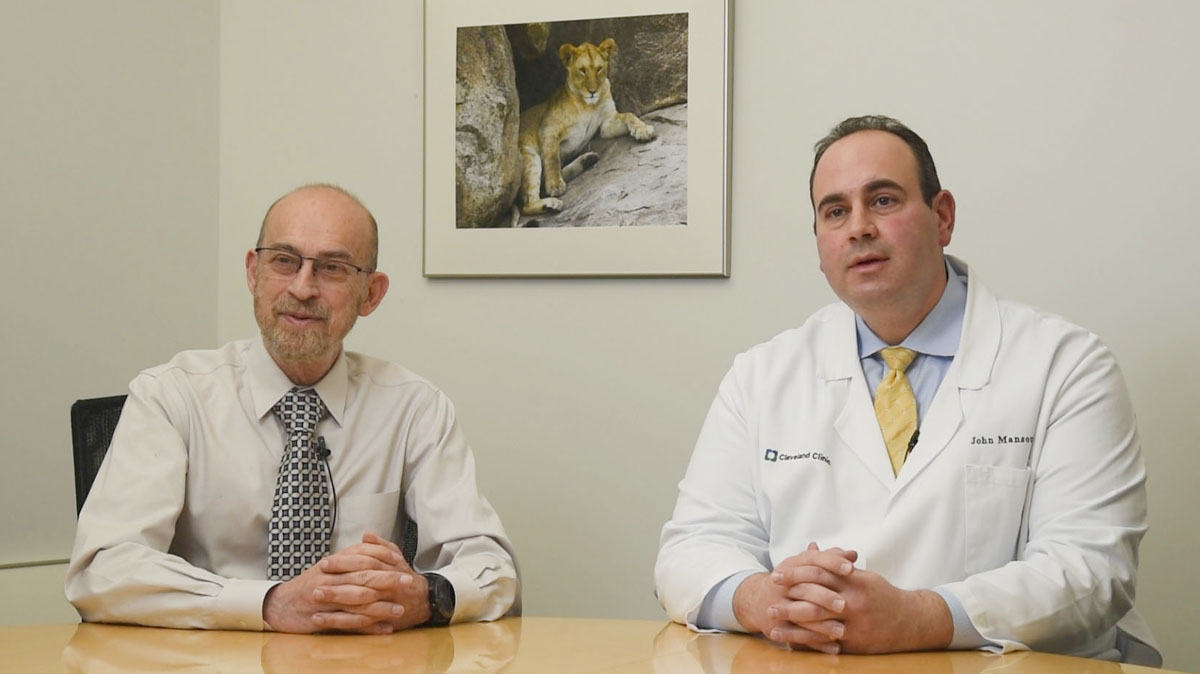Q&A with Dr. Nissen and Dr. Mansour – Ask the Heart Doctor

Subscribe: Apple Podcasts | Buzzsprout | Spotify
Q&A with Dr. Nissen and Dr. Mansour – Ask the Heart Doctor
Podcast Transcript
Announcer: Welcome to Love Your Heart, brought to you by Cleveland Clinic's Sidell and Arnold Miller Family Heart and Vascular Institute. These podcasts will help you learn more about your heart, thoracic and vascular systems, ways to stay healthy and information about diseases and treatment options. Enjoy.
Dr. Nissen: I'm Dr. Steve Nissen and I'm here with Dr. John Mansore. We just completed a web chat where we had a lot of really interesting questions. What were most of the questions about from your perspective, John?
Dr. Mansore: So, we had a little variety I think. One of the themes that kept recurring was the management of atrial fibrillation. I think it's important for us to individualize our recommendations depending on the individual patient's presentation. Another thing that seemed to come up was management of aortic aneurysms and aortic disease and again, it's always individualized. I want to emphasize that it's important for people to continue with their exercise regimens in terms of their cardiovascular exercise.
There will be some limitations in terms of resistance and strength training which can have some potential negative effects on aortic disease but overall we want to emphasize that it's important to continue your cardiovascular exercise.
Dr. Nissen: You know, with respect to atrial fibrillation, we got a lot of questions, and this is a disease which now as population is aging, it's increasing. Every year we see more and more patients with atrial fibrillation. There are some newer options, there are newer anticoagulants that people want to know about the use of in atrial fibrillation. Many more patients now have had an ablation. What we call a PVI or a pulmonary vein isolation procedures and then some of them have recurrence of their disease after that, and they want to know what should they do. There are a lot of questions about anticoagulation and what are the choices.
These are all very difficult decisions. It's often best for people that have these disorders to have a really good sub-specialist, an electrophysiologist, which is a cardiologist that has special expertise in heart rhythm disturbances and to try to get the best possible advice.
I agree with you, we heard a lot of questions about diseases of the aorta. Dilation or aneurysms of the aorta are also now seen with increasing frequency. The good news is, that there's a lot of data. We have a lot of great studies that tell us when should a patient undergo surgery, when the aorta gets to a certain size and how do we measure that size. We have a lot of good techniques now with imaging to do that, such as echo cardiography and CT scanning. A lot of our questioners wanted to know, how big is too big?
These are very important and very sensitive questions. You want to do an operation before something bad happens, but you don't want to do an operation too soon, because there is ... You never want to have an operation you don't need. So we tried to advice people to consult individuals with expertise. Not all general cardiologists have as much expertise in treating aortic disease and that same thing is true of course of atrial fibrillation.
So, there's nothing like seeing an expert and of course, we're always happy to see people here at the Cleveland Clinic where we have now 140 cardiologists, many of whom have very specialized expertise and we can always find the right person to see you if you have one of these more difficult disorders.
I would add one more theme. We told a lot of people who had very difficult questions, and it was uncertain whether they're getting the best advice to get second opinion and it's just never wrong to get a second opinion and so a piece of advice I've always given patients over the years is if you ask for a second opinion, and your doctor expresses resentment over your question about wanting a second opinion, then get a new doctor. Because good doctors are always welcoming patients to get another opinion. It's just a good idea to be certain when you have uncertainty.
Dr. Mansore: I would agree with that. I have if someone wants a second opinion, I encourage them to do so, and I think that's very good advice.
Dr. Nissen: Thank you for joining us.
Announcer: Thank you for listening. We hope you enjoyed the podcast. We welcome your comments and feedback. Please contact us at Heart@CCF.org. Like what you heard? Please subscribe and share the link on iTunes.

Love Your Heart
A Cleveland Clinic podcast to help you learn more about heart and vascular disease and conditions affecting your chest. We explore prevention, diagnostic tests, medical and surgical treatments, new innovations and more.


